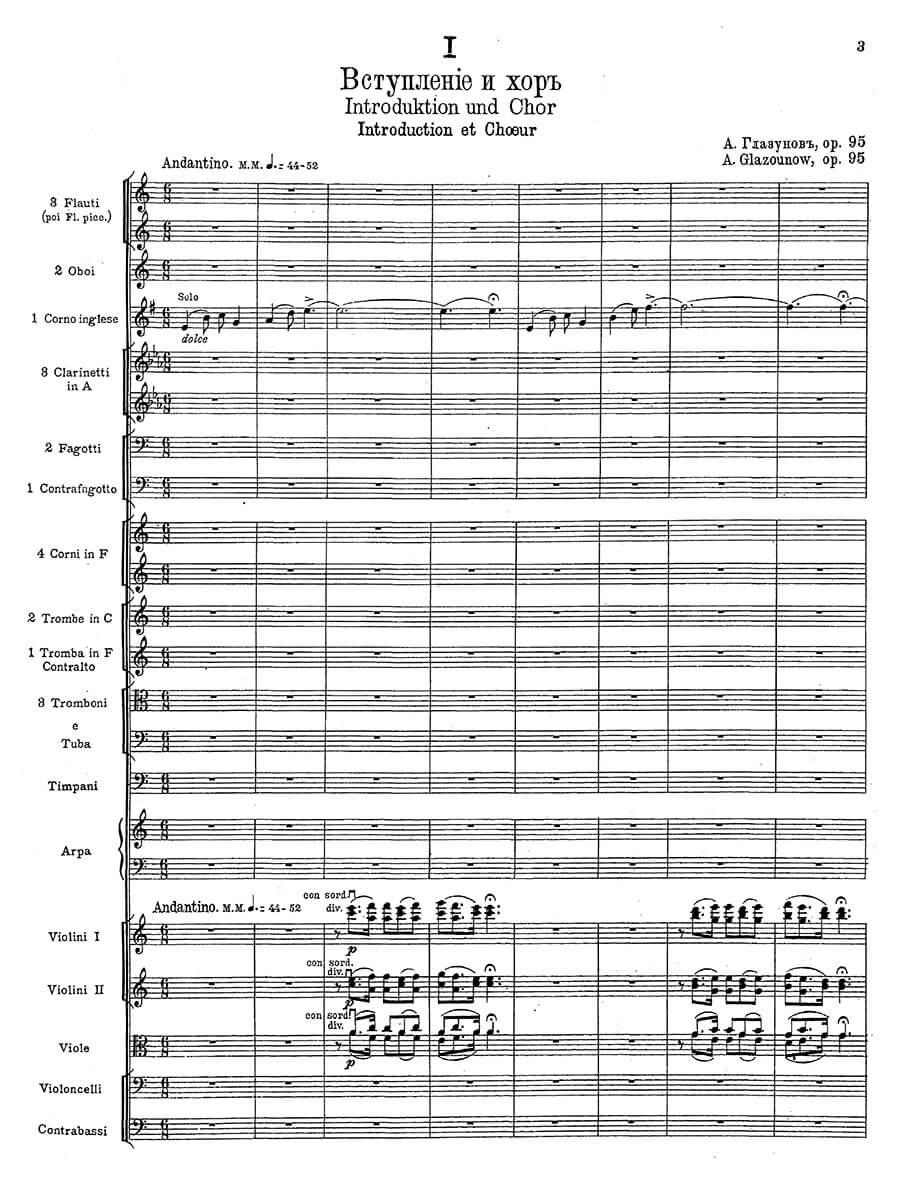Le Roi des Juifs (The King of the Jews) Op. 95, incidental music
Glazunov, Alexander
36,00 €
Preface
Alexander Glasunov – Le Roi des Juifs (The King of the Jews) Op. 95
(b. St. Petersburg, 29 July/10 August 1865 — d. Paris, 21 March 1936)
(1913)
I Introduktion und Chor. Andantino (p. 3) – Allegro moderato (p. 12) – Allegro (p. 17) –
Poco meno mosso (p. 19) – Andante (p. 20)
II Gesang der Jünger Jesu. Andante (p. 21)
III Zwischenakt zum zweiten Akt. Andante con moto (p. 23) – Agitato (p. 28) – Tempo primo (p. 31) – Tranquillo (p. 38)
IV Die Posaunenstöße der Leviten. Adagio (p. 41)
V Schluss des zweiten Akts. Andante sostenuto e pesante (p. 42)
VI Zwischenakt zum ersten Bild des dritten Akts. Allegro moderato (p. 45) – Poco più mosso (p. 49) – Tempo primo (p. 51) – Andante (p. 56)
VII Zwischenakt zum zweiten Bild des dritten Akts. Andante sostenuto – Andante (p. 62) –
Andante lugubre (p. 67) – Poco più mosso (p. 73) – Lento (p. 75)
VIII Syrischer Tanz. Lento (p. 76) – Allegro (p. 92) – Poco più mosso (p. 95) – Allegro (p. 99)
IX Zwischenakt zum vierten Akt. Adagio (p. 104) – Poco più mosso (p. 115) –
Moderato (p. 118) – Animato (p. 121)
X Hirtenschalmei. Allegretto (p. 126)
XI Psalm der Gläubigen. Moderato (p. 127)
Preface
Alexander Konstantinovich Glasunov is one of those composers who, on the one hand, have always been admired for their outstanding technical mastery in every respect – in his case this includes memorable melodic inspiration and the construction of the great symphonic forms beyond conventions – and, on the other hand, of whose rich œuvre only very few works have managed to be heard more often outside their Russian homeland: first and foremost the Violin Concerto in A minor op. 82 of 1904, and the late Concerto for Alto Saxophone and Strings op. 185 of 1933. His Saxophone Quartet of 1933 also belongs to the regular repertoire of the relevant ensembles, which, as in the case of the Saxophone Concerto, is mainly due to the fact that substantial literature for these instruments in the traditional Romantic idiom is extremely rare. On the other hand, his eight completed great symphonies and other orchestral works, as well as his ballets (for example, through Evgenij Svetlanov’s, Vladimir Fedoseyev’s, and most recently José Serebrier’s dedicated efforts), are regularly rediscovered and then disappear again into obscurity (Shostakovich’s great appreciation for the profound Mesto middle movement of the Eighth Symphony has been handed down by the professional liar Solomon Volkov). Glasunov’s chamber music, which includes eight string quartets and a string quintet, is hardly ever heard anyway, not to mention the two piano concertos or the ‘Concerto ballata’ for violoncello and orchestra. During his lifetime Glasunov was highly recognized and successful, although towards the end of his career in French emigration he had long been considered an old-fashioned romantic. …
Read full preface / Das ganze Vorwort lesen> HERE
Score Data
| Edition | Repertoire Explorer |
|---|---|
| Genre | Orchestra |
| Pages | 156 |
| Size | 210 x 297 mm |
| Printing | Reprint |
